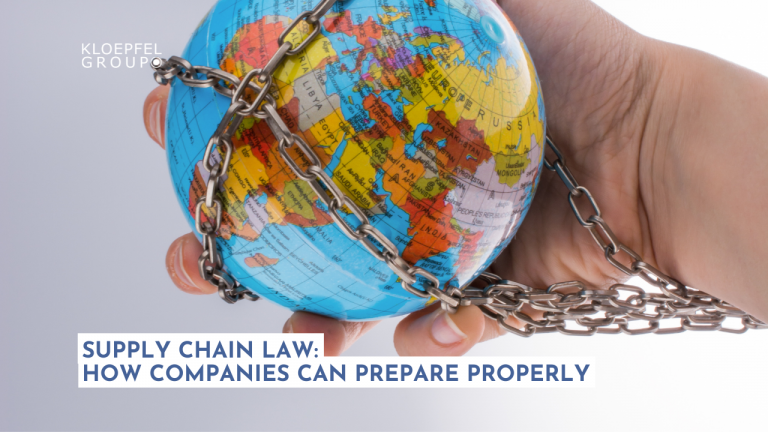At the beginning of 2023, the new Due Diligence Act, better known as the Supply Chain Act, will come into force and many German companies underestimate the challenges it poses. This is shown, for example, by a survey cited by the WELT.

Only 7 percent of the companies surveyed assume an increased or high risk in their supply chain in view of the new law. By contrast, the legal experts at Graf von Westphalen (GvW), the law firm that conducted the survey, believe the figure should be 46 percent.
The danger of such a misjudgment is that companies do not prepare themselves sufficiently. Then, in the worst case, there is the threat of high fines and a serious loss of image. But what measures should companies take now?
What is the Supply Chain Act?
The Supply Chain Act aims to “protect the rights of people who produce goods for Germany” and improve the protection of human rights in supply chains. It is also intended to reduce competitive disadvantages for companies that already invest in sustainable supply chain management of their own free will. To this end, companies are required to implement certain due diligence requirements.
The fact that such a law was passed is no surprise, even if there was much dispute about the final draft. After all, the German government had already tried it in 2016 with a voluntary commitment (National Action Plan for Business and Human Rights (NAP). The surveys, however, came to the sobering conclusion that this was not working. Therefore, the Supply Chain Act was passed in its final form on June 11, 2021.
Among other things, it requires companies to,
- adopt a policy statement on respect for human rights
- conduct a risk analysis of their supply chain and identify parts with high human rights and environmental risks
- implement risk management and preventive measures
- establish grievance mechanisms
- publicly document their actions.
The law distinguishes between direct and indirect suppliers. For direct suppliers, strict screening is mandatory; for indirect suppliers, companies only have to take action following complaints.
In addition, the Due Diligence Act will come into force in two stages:
- 2023 for all companies with at least 3,000 employees.
- 2024 for companies with more than 1,000 employees.
Smaller companies are not affected for the time being.
Important: If your company has fewer than 3,000 employees, this does not automatically mean that you can take it easy when it comes to preparations. At least suppliers to larger companies must be prepared for the fact that customers will soon be asking for information about their own supply chain. If this information is not available, conflicts are inevitable. So it is’s better to take action now.
What are the consequences of non-compliance?

Violations of the Supply Chain Act can be expensive. Depending on annual turnover, fines of up to 8 million euros or 2 percent of global annual turnover are possible. In addition, companies can be excluded from the award of public contracts. In addition, there are possible image losses. After all, customers are increasingly paying attention to the sustainability of companies.
So doing nothing is not only not an option for ethical reasons. On the contrary, the sooner companies take action, the better. The good news is that the Supply Chain Act can be easily implemented with thorough preparation. Companies will then also be better prepared for tighter regulations in the future.
How your company can prepare properly now
The measures your company should take now depend on the prerequisites. The following are central:
Collect and evaluate data
For medium-sized companies in particular, it is a major challenge to collect data on their supply chain. However, this is crucial in order to meet the requirements of the Supply Chain Act. Purchasing platforms that check whether due diligence requirements are being met, for example, provide support in this regard. In general, companies should evaluate data along their supply chains early and comprehensively and, if necessary, look for alternatives to existing suppliers.
Introduce or expand risk management

Even if risk management is in place, it is often necessary to expand it for the Supply Chain Act and specifically focus on human rights and environmental risks in your supply chain.
Among other things, the Supply Chain Act requires regular risk analyses. These differ from other risk analyses in that the first step focuses on potential risks for suppliers and only then on risks for your own company. If human rights violations are discovered, companies must take action. This does not mean that they have to break off their relationship with a supplier. But they should work with them to find solutions and draw up a plan of action.
Important: The first reports on compliance with due diligence obligations will be due as early as 2023. That’s why it’s not enough to set up a risk management system before then. Run it at least once with a partner like Kloepfel Consulting and fix any risks.
Establish grievance mechanisms
Also required by the Supply Chain Act is a grievance mechanism. This also needs lead time. If your company already has whistleblower hotlines, make sure they are suitable as human rights complaint mechanisms. For example, it is crucial that whistleblowers are not afraid of reprisals and that hotlines are accessible to all employees, regardless of language.
Revise contracts
If you haven’t already, incorporate human rights clauses into agreements and contracts. Specialists like Kloepfel Consulting, which specializes in supply chains, can help.
Acquire knowledge
You can only comply with the requirements of the Supply Chain Act if responsible persons in companies know about them. Sometimes it makes sense to conduct training on the topic of human rights in order to raise awareness. Kloepfel Consulting can also support you in this regard.
The German Supply Chain Act is only the first step

It is possible that the German Supply Chain Act will soon be “overhauled”. This is because the EU Commission intends to present a draft for an EU supply chain law before the end of December 2021. Its requirements for companies could go significantly beyond those in the German Supply Chain Act.
For example, a parliamentary proposal in March 2021 envisaged a duty of care for companies of all sizes and across the entire supply chain. SMEs could also be affected, depending on the industry, and there is even talk of civil liability.
This is another reason for companies to take the German supply chain law seriously and prepare for it early. Those that do more than what is necessary in the process will be armed for the future.
Contact:
Christopher Willson
Kloepfel Group
Tel.: 0211 941 984 33
Pempelforter Str. 50
40211 Duesseldorf
Mail: rendite@kloepfel-consulting.com


